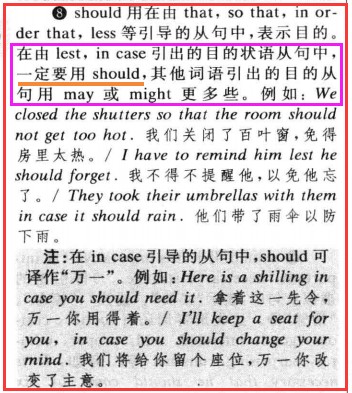2 辞书质疑(15):对《薄冰英语惯用法词典》一个观点的质疑
读了前面网友的一个“质疑”:
https://www.cpsenglish.com/question/57055
我查了一些资料,结果又发现了另一个可以“质疑”的观点:
商务印书馆国际有限公司出版的《薄冰英语惯用法词典》在 should 词条认为:
在由 lest, in case 引出的目的状语从句中,一定要用 should,其他词语引出的目的从句用 may 或 might 更多些。
这个说法是不是太绝对了。我查词典,in case 引出目的状语从句时不用 should 的例子不是一大把吗?比如用一般现在时和一般过去时等,就算是用情态动词,不是除了 should 还可以用 might 吗?这算不算一个低级错误?


最佳答案 2022-05-20 23:41
赞同曹老师的基本判断。我和大家分享一下我的理解,因lest 和in case 用法基本相同,以下以in case 为例:
一、如果针对正式文体而言,薄老的说法不错。如果从日常应用角度来说,薄老的说法早已过时。
依据:1. 《牛津英语用法指南》231词条:原文:“Should can be used in the same way in British English, but this is no longer very common. 例:... in case your mother should stay to lunch.
该书lest 词条同时指出lest和in case 用法基本相同, lest在美语正式文体会出现,英语中已罕见。
2. 《朗文词典》case 词条: In more formal English, you can say in case something should happen: Here’s a contact number, in case there should be a problem.
二、in case 在美国英语中有时可以=if, 通常用于句首。但在英国英语中有时不能=if. 意思为”万一“。
依据:1. 《朗文词典》case 词条:b) American English if In case I’m late, start without me.
2. 《牛津英语用法指南》248词条:(此词条讲了英国英语中的in case 和if 的不同。)
In British English, in case and if are normally used in quite different ways. 'Do A in case B happens’ means 'Do A (first) because B might happen later'. 'Do A if B happens’ means 'Do A if B has already happened’. Compare:
- Let's buy a bottle of wine in case George comes. (= Let’s buy some wine now
because George might come later.)
Let's buy a bottle of wine if George comes. (= We’ll wait and see. If George comes, then we’ll buy the wine. If he doesn’t we won't.)
3. 《剑桥词典》也提到二者的不同,写道:We don’t use in case to mean ‘if’.
https://dictionary.cambridge.org/grammar/british-grammar/in-case-of?q=in+case
二、薄老认为一定要用should 的说法,不严谨。不用should的情况更多些。如用现在时表示将来的情况。
网友需要注意的是:现在时包括一般现在时,现在进行和现在完成时都有可能。
依据:《牛津英语用法指南》: A present tense is normally used with a future meaning after in case even if the main verb is present or past. (注意即使主句动词为过去时,in case 后仍可以用现在时)
例:I've bought a chicken in case your mother stays to lunch. (我理解:这里如果主句改为一般过去时 I bought a chicken yesterday in case your mother stays to lunch. 也应该是对的,(用于说话时母亲还没有走的语境)。“指南”的作者可能没有考虑这么细致,没有提供这样一个例句)
三、in case 后也可以用must, 也可以省略may/might/should直接用动词原形。
外刊例句:
1. They are necessary, too, in case evacuation plans must be abandoned or in case disaster strikes with insufficient warning.
2. There must also be a responsible adult available at all times to substitute for the director in case he must leave the nursery .
3. In case he found himself on the losing side, after all, he had had all his movable belongings sent abroad, and his horses were saddled and ready in case he must flee to the coast.
4. Then I will leave my power of attorney with Bigiel in case I must go on a journey.
5. I felt he should know in case he go there in the daytime and be hurt or worst killed.(go和be前省略might)
6. I headed over in case he need backup. (need前省略might/should)
比较:There are grab bars in the bathroom, a walk-in shower, an alarm system in case he needs help.(这里need为普通实义动词的一般现在时)
如果觉得我的回答对您有用,请随意打赏。你的支持将鼓励我继续创作!

其它 1 个回答
我个人觉得薄冰说的没有错,只是有些绝对。把一定二字改为应该二字就好了。lest是很正式的用词,从句用动词原形式虚拟语气,或者用should do。用其他情态动词就不够规范,至少和lest这个词的语体不相称。而in case引导的从句其实是目的和条件的结合,带有明显的条件意味,而在真实条件句中,should 表示万一的意思。例如,If it should rain tomorrow,...。由于in case 兼有条件意味,而现代英语中真实条件句(可能实现的条件)可以用陈述语气,所以in case引导的目的从句既可以用陈述语气,也可以用should do. 用may/might也有,但比较少,不如should正规。
如果觉得我的回答对您有用,请随意打赏。你的支持将鼓励我继续创作!

- 3 关注
- 2 收藏,2247 浏览
- 黄力松 提出于 2022-04-11 17:52
相似问题
-
 《高考英语备考1号·速效编》
《高考英语备考1号·速效编》
-
 《高考英语备考1号·写作编》
《高考英语备考1号·写作编》
-
 《高中英语晨读晚记》
《高中英语晨读晚记》
-
 《高中英语错题笔记》
《高中英语错题笔记》
-
 《零起点考大学英语》
《零起点考大学英语》
-
